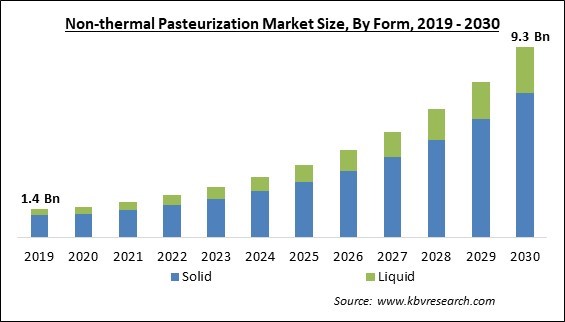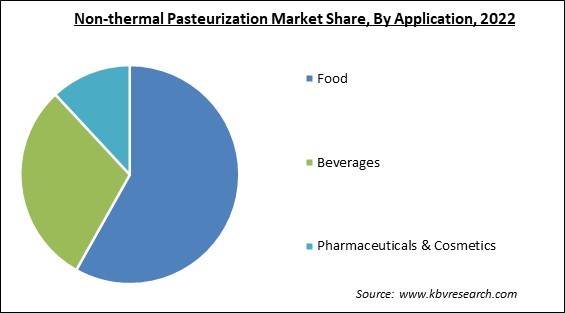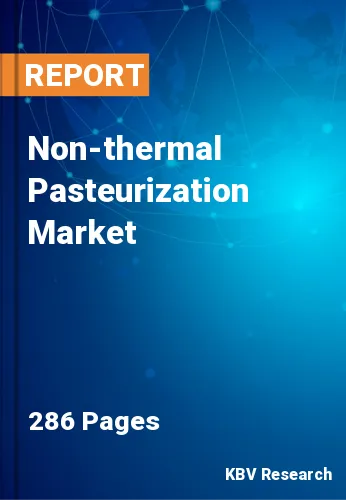The Global Non-thermal Pasteurization Market size is expected to reach $9.3 billion by 2030, rising at a market growth of 20.9% CAGR during the forecast period.
European regulations are increasingly favoring non-thermal pasteurization methods. The European Union has approved certain non-thermal technologies, such as HPP, as a valid pasteurization process. Consequently, Europe is anticipated to acquire more than 29% share of the market by 2030. This regulatory support legitimizes these technologies and encourages their adoption in the food industry. Food without chemicals or preservatives is in demand as consumers become more health conscious. Therefore, the Europe is the promising region for this technology. Some of the Factors impacting the market are rising consumption of dairy, poultry, and meat products, increasing government investment in the food processing industry, and demand for significant capital expenditures.

One of the main uses for food and beverage processing equipment is processing dairy, meat, and poultry products. The increased demand for nutritious food products and the rising consumption of frozen meat, fruits, and vegetables, as well as protein-based foods in industrialized nations, are driving up food production costs. Due to the rising demand for dairy, beef, and poultry products, non-thermal pasteurization techniques are becoming increasingly popular. A growing sector of the economy that has gained momentum recently is the food processing industry (FPI). The importance of industry cannot be overstated because of the vital connections and synergies it promotes between the two pillars of economy, industry, and agriculture. It has great potential to boost economic growth, which has led many governments to implement various legislative measures to help the food processing sector. Hence, since consumer demand for food and beverage products is increasing, the demand for food processing technology and equipment is expanding quickly, which is extremely beneficial for expanding the market.
However, one of the main barriers to the market is high capital expenditure. While non-thermal pasteurization technologies offer benefits such as improved quality and nutritional retention, they can be costlier compared to traditional thermal methods. For small and medium-sized food and beverage producers, the high-pressure processing (HPP), ultraviolet (UV) radiation, and pulsed electric field (PEF) non-thermal pasteurization processes demand sizable infrastructure and equipment investments.
Based on form, the market is characterized into solid and liquid. The liquid segment procured a considerable growth rate in the market in 2022. The food industry uses pulsed electric fields for non-thermal processing on a large scale. It is mostly used to produce liquid food, such as fruit juices, non-alcoholic beverages, alcoholic beverages, etc. As non-thermal preparation can also stop the activity of enzymes, which cause fruits and vegetables to deteriorate, they are extremely efficient in maintaining the shelf-life of liquid consumables.
On the basis of application, the market is classified into food, beverages, and pharmaceuticals & cosmetics. The food segment acquired the largest revenue share in the market in 2022. The need for ready meals has increased the need for non-thermal pasteurization techniques to create safer ready meals while maintaining the product's quality and nutritional content. Changing lifestyles and customer preferences for quick and simple-to-prepare food options are the main factors driving the increase in the segment. Many businesses in the food sector are making investments in non-thermal pasteurization techniques to accommodate this need.

By food type, the market is divided into fruit & vegetables, dairy products, and others. The fruit and vegetables segment witnessed the maximum revenue share in the market in 2022. The demand for processing fruits and vegetables is driven by dual-income households and a significant change in consumer lifestyle. The quality and storage life of fruits and vegetables is improved by processing. The preservation of vitamins, nutrients, and flavor of food products can all be achieved by processing fruits and vegetables. Food that has been processed is kept in cans containing pulp fruit bits or juices.
On the basis of technique, the market is classified into high pressure processing, pulse electric field, microwave volumetric heating, ultrasonic & irradiation, and others. The high-pressure processing segment recorded the largest revenue share in the market in 2022. High hydrostatic pressure (HHP) or ultra-high pressure (UHP) are additional terms for high-pressure processing (HPP). It has been demonstrated that HPP can inactivate germs and denature several enzymes without compromising flavor or nutritional profile. The product is transported horizontally through the pressure chamber by a conveyor belt in horizontal HPP equipment. Juices and sauces, which have low viscosities and can readily flow through the machine, are good candidates for processing with this equipment.
| Report Attribute | Details |
|---|---|
| Market size value in 2022 | USD 2.1 Billion |
| Market size forecast in 2030 | USD 9.3 Billion |
| Base Year | 2022 |
| Historical Period | 2019 to 2021 |
| Forecast Period | 2023 to 2030 |
| Revenue Growth Rate | CAGR of 20.9% from 2023 to 2030 |
| Number of Pages | 286 |
| Number of Table | 530 |
| Report coverage | Market Trends, Revenue Estimation and Forecast, Segmentation Analysis, Regional and Country Breakdown, Competitive Landscape, Companies Strategic Developments, Company Profiling |
| Segments covered | Form, Technique, Application, Region |
| Country scope | US, Canada, Mexico, Germany, UK, France, Russia, Spain, Italy, China, Japan, India, South Korea, Singapore, Malaysia, Brazil, Argentina, UAE, Egypt, South Africa, Nigeria |
| Growth Drivers |
|
| Restraints |
|
Region wise, the market is analyzed across North America, Europe, Asia Pacific, and LAMEA. The North America segment garnered the maximum revenue share in the market in 2022. The demand for nutritious and minimally processed food items has increased, and regulatory improvements aimed at enhancing food safety have contributed to the growth in the market in this region in recent years.
Free Valuable Insights: Global Non-thermal Pasteurization Market size to reach USD 9.3 Billion by 2030
The market research report covers the analysis of key stake holders of the market. Key companies profiled in the report include Thyssenkrupp AG, Kobelco Construction Machinery Co., Ltd. (Kobe Steel, Ltd.), Nordion, Inc. (Sotera Health LLC), Groupe Legris Industries, JBT Corporation, Lyras A/S, Hiperbaric, S.A., The MULTIVAC Group, Syntegon Technology GmbH (Bosch Packaging Technology), Pulsemaster bv, and Pricewaterhousecoopers LLP (PwC).
By Form
By Application
By Technique
By Geography
The Market size is projected to reach USD 9.3 billion by 2030.
Rising consumption of dairy, poultry, and meat products are driving the Market in coming years, however, Demand for significant capital expenditures restraints the growth of the Market.
Thyssenkrupp AG, Kobelco Construction Machinery Co., Ltd. (Kobe Steel, Ltd.), Nordion, Inc. (Sotera Health LLC), Groupe Legris Industries, JBT Corporation, Lyras A/S, Hiperbaric, S.A., The MULTIVAC Group, Syntegon Technology GmbH (Bosch Packaging Technology), Pulsemaster bv, and Pricewaterhousecoopers LLP (PwC).
The expected CAGR of this Market is 20.9% from 2023 to 2030.
The Solid segment is leading the Global Non-thermal Pasteurization Market by Form in 2022, achieving a market value of $7.0 billion by 2030.
The North America market dominated the Global Non-thermal Pasteurization Market by Region in 2022 and would continue to be a dominant market till 2030; thereby, achieving a market value of $3.2 billion by 2030.
Our team of dedicated experts can provide you with attractive expansion opportunities for your business.

